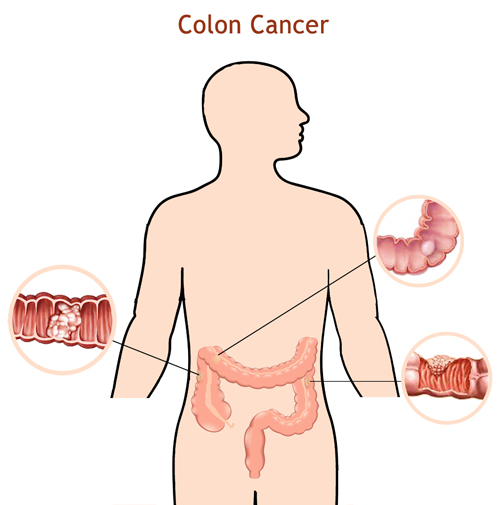 Colon cancer is common in both males and females. This term signifies the cancer of the large intestine. Cancer of the rectum is termed as rectal cancer. Rectum is the last part of the large intestine.
Colon cancer is common in both males and females. This term signifies the cancer of the large intestine. Cancer of the rectum is termed as rectal cancer. Rectum is the last part of the large intestine.
Most of the cases of colon cancer start with the development of non-cancerous (benign) polyp in the walls of colon. When these polyps are left untreated, they turn cancerous.
Causes of the colon cancers:
The exact cause of development of the colon cancer is not known. Cells in our body grow and divide in a particular order. This helps in the normal functioning of all the systems of the body. Sometimes, this rhythm gets disturbed and body produces excessive amount of the damaged cells. These cells are termed as cancerous cells. These cells can travel via blood and lymph to distant parts and thus cancer spreads to other body parts.
Symptoms:
Early cases of colon cancer do not show any symptoms. When the disease advances following symptoms may be seen.
- Change in bowel habits. Person may suffer from diarrhea or constipation. They may notice change in the consistency of the stools.
- Presence of blood in the stool.
- Abdominal discomfort such as cramps, gas or tenderness in the lower abdomen.
- A constant feeling of not emptied the bowel completely.
- Unexplained weight loss
- Fatigue and weakness.
Risk factors:
- History of having cancer of the colon in the family.
- People who are more than 60 years of age
- History of unattended polyps in the colon
- Lack of fibers in the diet
- Excessive consumption of processed meat, non-vegetarian food.
- Excessive consumption of alcohol
- Having history of inflammatory bowel disease ( ulcerative colitis or Crohn’s disease)
- If the person has history of breast cancer.
- If a person is suffering from Familial Adenomatous Polyposis (FAP)
Diagnosis: There are various tests and investigations available to diagnose the colon cancer.
Sigmoidoscopy or colonoscopy: This is the investigation in which a long, thin, flexible tube with camera on one end is passed through the colon. In Sigmoidoscopy the tube is inserted up to sigmoid colon or lower part of the colon and in colonoscopy the tube is inserted further.
While examining the colon with a scope, if the doctor finds anything unusual in the wall of intestine then he sends that tissue for biopsy. In biopsy the tissue is examined microscopically to find out whether the growth is malignant or benign.
Barium enema: In this procedure barium enema is given to the patient and then X-Rays are taken. X-ray will show presence of any growth inside the colon.
Blood tests, ultrasound of abdomen, MRI scan and CT scan are the other tests which can be done to confirm the diagnosis.
“Virtual colonoscopy” (CT colonography) is the latest test which takes the multiple images of the inside of the colon. This test is done especially when the patient is unable to undergo colonoscopy.
Stages of the colon cancer:
Once the diagnosis of cancer is confirmed in a patient, the doctor will try to know the spread or the extent of the cancer. The spread or the extent of the cancer is divided into four stages.
- Stage I: The cancer grows through the superficial lining of the colon but it does not spread beyond the walls of the colon or rectum.
- Stage II: Cancer passes through the wall of colon but does not spread into lymph nodes.
- Stage III: Cancer spread is limited up to lymph nodes but has not affected the nearby organs.
- Stage IV: Distant organs are affected by the cancer cells. This is called as metastasis.
Colon Cancer Treatment: The treatment varies according to the stage of the cancer.
If the cancer is localized and not spread outside the mucosal linings of the colon then while doing colonoscopy doctor will remove the mass. If it is not able to remove the growth through colonoscopy then he may perform laparoscopic surgery.
Partial colectomy, permanent colostomy or temporary colostomy is some of the other procedures done depending on the extent of the cancer.
Chemotherapy and radiotherapy are also the options available to destroy the cancer cells.
The treating doctor will decide about the best mode of the treatment for colon cancer in a particular patient.





2 Comments